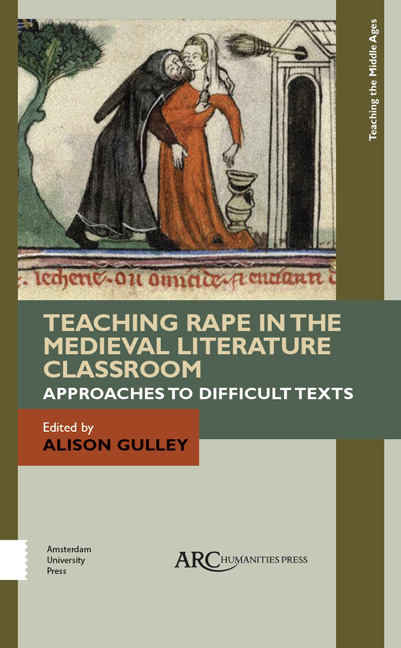Book contents
- Frontmatter
- Contents
- Acknowledgements
- Chapter 1 Introduction: Teaching Rape and Meeting the Challenges of the TwentyFirstCentury Classroom
- Chapter 2 Medieval Saints and Misogynist Times: Transhistorical Perspectives on Sexual Violence in the Undergraduate Classroom
- Chapter 3 Teaching Medieval Rape Culture across Genre: Insights from Victimology
- Chapter 4 Bringing the Bystander into the Humanities Classroom: Reading Ancient, Patristic, and Medieval Texts on the Continuum of Violence
- Chapter 5 From Bystander to Upstander: Reading the Nibelungenlied to Resist Rape Culture
- Chapter 6 Speech, Silence, and Teaching Chaucer’s Rapes
- Chapter 7 Classroom PSA: Values, Law, and Ethics in “The Reeve’s Tale”
- Chapter 8 “How do we know he really raped her?”: Using the BBC Canterbury Tales to Confront Student Skepticism towards the Wife of Bath
- Chapter 9 Teaching the Potiphar’s Wife Motif in Marie de France’s Lanval
- Chapter 10 Sexual Compulsion and Sexual Violence in the Lais of Marie de France
- Chapter 11 Troubadour Lyric, Fin’amors, and Rape Culture
- Chapter 12 The Knight Coerced: Two Cases of Raped Men in Chivalric Romance
- Chapter 13 Teaching Rape to the HeMan Woman Haters Club: Chrétien de Troyes at a Military School
- Chapter 14 Rape, Identity, and Redemption: Teaching “Sir Gowther” in the Community College Classroom
- Notes on Contributors
- Index
Chapter 5 - From Bystander to Upstander: Reading the Nibelungenlied to Resist Rape Culture
Published online by Cambridge University Press: 23 January 2021
- Frontmatter
- Contents
- Acknowledgements
- Chapter 1 Introduction: Teaching Rape and Meeting the Challenges of the TwentyFirstCentury Classroom
- Chapter 2 Medieval Saints and Misogynist Times: Transhistorical Perspectives on Sexual Violence in the Undergraduate Classroom
- Chapter 3 Teaching Medieval Rape Culture across Genre: Insights from Victimology
- Chapter 4 Bringing the Bystander into the Humanities Classroom: Reading Ancient, Patristic, and Medieval Texts on the Continuum of Violence
- Chapter 5 From Bystander to Upstander: Reading the Nibelungenlied to Resist Rape Culture
- Chapter 6 Speech, Silence, and Teaching Chaucer’s Rapes
- Chapter 7 Classroom PSA: Values, Law, and Ethics in “The Reeve’s Tale”
- Chapter 8 “How do we know he really raped her?”: Using the BBC Canterbury Tales to Confront Student Skepticism towards the Wife of Bath
- Chapter 9 Teaching the Potiphar’s Wife Motif in Marie de France’s Lanval
- Chapter 10 Sexual Compulsion and Sexual Violence in the Lais of Marie de France
- Chapter 11 Troubadour Lyric, Fin’amors, and Rape Culture
- Chapter 12 The Knight Coerced: Two Cases of Raped Men in Chivalric Romance
- Chapter 13 Teaching Rape to the HeMan Woman Haters Club: Chrétien de Troyes at a Military School
- Chapter 14 Rape, Identity, and Redemption: Teaching “Sir Gowther” in the Community College Classroom
- Notes on Contributors
- Index
Summary
The concept of rape culture in higher education has come under increasingly close media scrutiny at local, state, and national levels. In this chapter, against a background of heightened awareness and of renewed conversation about campus sexual assault, I would like to frame a discussion of the Middle High German Nibelungenlied. I argue that this frame offers an unexpected perspective for reading the Nibelungenlied in the context of teaching rape and medieval literature, providing a unique opportunity to create dialogue between thirteenthcentury texts and twentyfirstcentury students/ readers. The Nibelungenlied is, of course, a wonderfully complex work with an equally complicated reception history from the Middle Ages to the present. As a work of Middle High German courtly literature, it also undeniably participates in the rape narrative that Kathryn Gravdal established as integral to medieval romance. The thirteenthcentury text has one episode in particular that offers a direct and immediate connection to issues of concern on a twentyfirstcentury college campus: the tenth adventure. The tenth adventure describes the double wedding of Burgundian king Gunther and his sister Kriemhild (to Brunhild and Siegfried respectively). This adventure can easily be read by modern undergraduates as a very humorous scene. The muchanticipated bridal night proves challenging for Gunther when his new bride Brunhild unceremoniously hangs him from a nail on the wall of their bedchamber and leaves him there until dawn. The next night, Gunther's new brotherinlaw Siegfried dons his cape of invisibility and comes to Gunther's aid, duelling with Brunhild in the king's bedchamber while the king listens under the bed. Siegfried defeats Brunhild and leaves, Gunther takes his place, and the episode ends without further incident.
The audience, medieval or modern, can scarcely deny the humour of a newly married king ignominiously hanging on the wall, bound hand and foot by his bride on their first night together, pleading to be released. The audience is likewise intended to find humour in the king's request for help from his best friend and new brotherinlaw to subdue his bride. The second night's wrestling match between Siegfried and Brunhild, however, “resolves” the hitherto slapstick comedy through a violent act of physical force that modern students clearly identify as rape
- Type
- Chapter
- Information
- Teaching Rape in the Medieval Literature ClassroomApproaches to Difficult Texts, pp. 63 - 76Publisher: Amsterdam University PressPrint publication year: 2018



